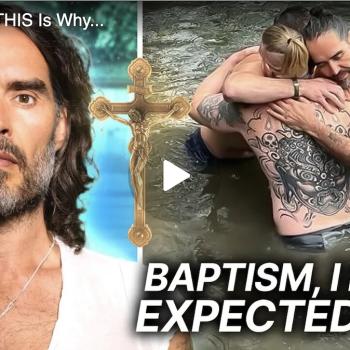Lig Duncan has promised us he will write more on the reasons why this debate is not an easy one to resolve. His statement got me thinking, and while I’m still resisting the temptation to state who I agree with, it has rattled around in my brain long enough for me to want to have a go at explaining why these disagreements are almost inevitable.
To me the whole issue is about something else altogether. It’s really about authority. Different understandings of how to run a local church make these differences almost inevitable. If you believe that a church should be run by its congregation, then you will be more careful about who you allow to become a member. Churches have allowed flexibility in the view of baptism in their members before, and found that over time the church has switched sides on the issue of paedobaptism versus credobaptism. It is interesting that the congregation of John Piper’s church has, so far, refused to allow him to follow his convictions on this issue. In fact, it is more surprising in a way that Piper feels the way he does, given that he has a congregational form of church government, at least on paper.
If your church is run by local elders, and the congregation can only show their dissent by speaking to their leaders or eventually by leaving, I can imagine that leaders may be more relaxed about allowing members to have a different viewpoint, presumably while insisting that future leaders will have a similar perspective to the existing leaders.
There are also differences about how the local church is viewed, and how tightly defined doctrinally church memberships should be. I think that one thing we can all agree on is that there are genuine Christians who differ from us theologically. I, for one, have a very loose definition of a Christian. When the Bible says, “If you confess with your mouth that Jesus is Lord and believe in your heart that God raised him from the dead, you will be saved” (Romans 10:9), who am I to add further conditions?
However, I do believe that faith in Christ should be accompanied with trust in his Word and a humble submission to it. Thus, sometimes I find the boundaries of precisely who is saved and who is not hard to define. In fact, I do not feel that it is my job to say definitely that an individual is a genuine Christian or not. It is because of this grey area that many will place a further level of limits on church membership. Thus, a local church will usually define what it thinks is a Christian in good standing a little more tightly than the lowest possible denominator of professed faith in Christ. This makes sense, not least because it would exclude someone living in blatant sin while claiming to be a Christian. There are surely few churches that would allow membership to everyone who claims to be a Christian.
But for many the local church is not simply a collection of everyone we believe to be saved and in a good standing before God. For most churches there are secondary doctrines used as identification markers. As a result, some will define their membership requirements to include agreement with some of these doctrines. This is to protect the doctrinal integrity of the local church and becomes more important if authority in the life of the church rests with the congregation.
Since many Baptist churches in particular take a valid believer’s baptism to be the gateway to church membership, it is little wonder that many of them would deny membership to the unbaptized. Since many paedobaptist churches will recognize either believer’s or infant baptism as valid, it is no wonder that they allow people who hold to both perspectives to become members.
Similar issues arise about the Lord’s Supper. People have differing perspectives about who should be allowed to partake. In a large church it can be next to impossible to manage a communion service which is in any way closed, so it often becomes a free-for-all. The issue of who can take the Lord’s Supper then becomes an irrelevance. In smaller churches, frequently leaders believe that some care should be taken about to whom the Lord’s Supper is administered. If the Lord’s Supper is seen as a meal for church members rather than any professor, is it any wonder that some get to the position that those who do not qualify for membership in a local church should not share the Supper with that church?
In short, I believe that these kinds of decisions should be taken by the local church’s leadership teams. I would not presume to tell them how they should act. I respect their right to have differing opinions and to change those opinions, as both Grudem and Piper have done.
As Duncan was insinuating, for those who truly believe in the truth of the Bible and the importance of doctrine, it is no surprise, given our fallibility, that we have different doctrinal positions and different opinions about how to act in the local church in light of those differences. Ecumenicalism hides our differences in order to pretend we are one. True biblical unity acknowledges our differences, respects them, and goes on to partner for the sake of the Gospel. We may find that we can partner only to a certain extent with some, since to go further would require us to compromise our convictions, which although secondary, we should not be forced to give up. Thus a complex web of partnerships will emerge, some closer than others. It is not wrong for us to agree to partner in some ways, but not in others, with those with whom we differ on many issues.
I hope that makes some sense, although I am sure that Lig will do a better job of explaining it!












